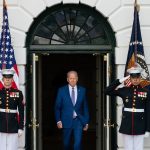Democrats are stepping up their efforts to defend President Biden from criticism in the news media. However, they argue that their approach is different from that of former President Trump, who often attacked specific reporters and the media as a whole. Eric Schultz, a former White House spokesman, believes that the media has made mistakes and that accountability is necessary. He views the upcoming election as a contest between democracy and autocracy and believes that the stakes are high.
On the other hand, Republican strategist Brad Todd points out the hypocrisy of Democrats criticizing Trump’s remarks about the media while now being critical themselves. He recalls when Democrats said that Republican critics of the media were a danger to democracy. Todd’s comments suggest that Democrats are being inconsistent in their views on the media.
Political and media historian Brian Rosenwald explains that Democrats may not criticize the media as consistently as Republicans because there are fewer liberal-leaning outlets that have a financial incentive to drive mistrust. Additionally, Democratic voters may not expect their party to criticize the media as much. However, Rosenwald does acknowledge that some Democrats are concerned about the media’s coverage of Trump and worry about a repeat in the 2024 election.
Other Democratic criticisms of the media include its focus on Biden’s age and mistakes, as well as negative coverage of the economy, particularly inflation. However, David Greenberg, a professor of history, journalism, and media studies, argues that politicians should focus on promoting their own achievements rather than complaining about media coverage. Greenberg believes that it is difficult to argue that Biden receives worse press than Trump.
The White House and the Democratic National Committee (DNC) have taken a more assertive communications strategy in response to Republican criticisms. The White House Office of General Counsel distributed a memo criticizing House Republicans’ false claims regarding the impeachment inquiry. The memo argues that covering impeachment as a process story without scrutinizing these claims is a disservice to the American public. The DNC has also amplified an MSNBC segment criticizing the media’s focus on Biden’s age.
These strategies reflect the Democrats’ growing anxiety about Biden’s prospects in the upcoming election, particularly with Trump dominating the Republican primary. Despite Trump’s popularity among GOP voters, Biden remains competitive in head-to-head polling. However, Biden acknowledged that his predecessor may be the nominee again and expressed surprise that the media hasn’t asked about the auto strike, a topic unrelated to his conversation with Israeli Prime Minister Benjamin Netanyahu.
In response to these criticisms, White House spokesman Michael Kikukawa emphasized Biden’s accomplishments and portrayed Congressional Republicans as “extreme” with misplaced priorities. He highlighted Biden’s efforts to rally support for Ukraine and criticized House Republicans for proposing cuts to important programs without supporting additional aid for disaster relief or Ukraine.
Overall, Democrats are taking a more assertive approach with the news media in an attempt to defend Biden and counter Republican criticisms. However, their strategy has drawn comparisons to the tactics used by Trump, which Democrats previously condemned.




